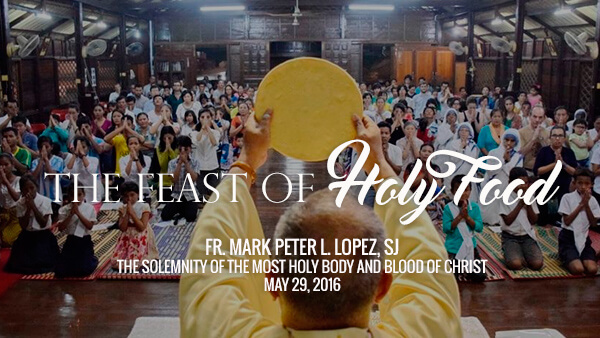


Fr. Mark L. Lopez, SJ
The Solemnity of the Most Holy Body and Blood of Christ
May 29, 2016
When was the last time you tasted love in your food? Not during those rushed, 15-minute lunches at the office cafeteria, I’m sure. But maybe on your last visit to your favorite restaurant ? On an auspicious day, perhaps, when the chef felt more inspired than usual and added extra portions of passion into the preparation? Or maybe at that pot-luck get-together at your friend’s place when everybody cooked something of their own to share. Or better yet, and most surely, when your Mom last cooked for you.
For as long as I can remember, my Mom was into food. I mean, not just in the way we can all claim our moms are, but, professionally. Cooking for people was always her passion, and so she made it into a small business. Thankfully, even as Mom gracefully enters her eighties, her mouth-watering callos, lengua, osso buco, lasagna, ensaymadas and chocolate cupcakes (to name but a few) remain popular favorites at our local weekend community market. Some years back, we were thrilled to see Mom interviewed for a TV show, along with two other well-known chefs. At the end of the interview, she was asked if there was anything she could give by way of advice to young aspiring cooks among the viewers. To this day, I remember how she replied. “Whether you are cooking for five, fifty or five hundred people,” she said, “just imagine you are cooking for your family. Then, your love will surely go into the food.”
Now, I don’t think Jesus did any serious cooking back in his time, apart from roasting those fish on the shores of Tiberias, I mean. And I am certain he could not make callos better than Mom’s, but by today’s feast and readings, it sure sounds like Jesus too, put his love into the food. I can imagine him, so tenderly taking the bread to bless it, before sharing it, either with his 12 closest friends, or his 5,000 fans.
Jesus put so much of his love into the food, in fact, that the food became self-gift, that this food, so charged with his love, becomes his very presence. “This is my body. This is my blood.” The command he leaves, however, is not just to eat, but to “Do this” (this self-giving act) “in memory of me”.
I don’t think these words were meant solely to inspire a way of praying. Rather, this command has left us with both a ritual and a way of life to follow. Jesus invites us, by these words, to break the bread of our lives and pour out the wine of our spirits, to share this with others, always in remembrance of him.
Beautifully also, both the Gospel and the first reading remind us that this bread-breaking-wine-sharing way of Jesus is to be done, not only to our little circles of family and friends. As Melchizedek welcomed and fed the worn-out and weary strangers in the first reading, and as the disciples helped to feed the hungry multitudes in the third, so are we invited by Jesus to do the same, especially for the poor of our time and for those who come to us in great need.
A final word for you to chew on today, this Feast day of Holy Food. In the Judaic tradition, before and during Jesus’s time, priests at the Temple in Jerusalem made sure there was always Holy Food (what our brother and sister Jews called shew bread) visibly left near the altar of offering, a symbol of consecration of God’s people. In many popular spiritualities which are seen to this day, such offerings of Holy Food are also made. These are believed to please God (or whatever deities or Spirits these are offered to). Holy Food was not to be eaten by lay people (possibly only by the priests, who would then act in God’s behalf to receive these offerings). By what Jesus has done, however, God turned such a spirituality upside-down and inside-out. No longer is God, He to whom the offering is made. Rather, God has become the humble offerer, giving us His own Body and Blood. In this new economy of salvation, God does not need our offerings, it is we who need His. (Recall Pope Francis’ reminder then, of how the Eucharist is not a prize for the worthy. No, it is food for us sinners, that we may be strengthened and be saved.)
And so, come consecration time, when the priest blesses the bread and wine, please remember that it isn’t the priest’s hands or our prayers that make the bread and wine Holy. It is God’s love that does so. And in typical, God-like, super abundant fashion, this love is so intensely poured out, such that it transforms the food and drink into His very presence, love incarnate.
Feast today, therefore, on His life-giving presence and self-gift. Eat of this Holy Food. Taste. Savor. Relish the Love and pray. Pray to know how to share this love with those in greatest need.
Happy Feast of the Corpus Christi!